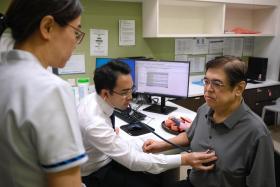Polyclinics help with early detection of mental health issues
Bringing mental health treatment to familiar settings like polyclinics helps destigmatise such conditions, says doctor
As she treated one of her diabetic patients, family physician Winnie Soon noticed another condition had taken root.
This patient was showing signs of depression, due to a "recent bereavement" in her family, and the mental illness was affecting her physical health.
Acting quickly, Dr Soon referred her patient to a psychologist, and she was then taken for counselling.
This detection was possible thanks to a partnership between the National Healthcare Group Polyclinics (NHGP), the Institute of Mental Health and Khoo Teck Puat Hospital (KTPH).
The NHGP dealt with about 2,800 mental health patients between October 2015 and last September.
Through this collaboration, which began in 2012, polyclinic doctors and general practitioners are trained to detect signs of mental health conditions.
This allows them to diagnose and prescribe treatment for such conditions, be it through medication or follow-ups with community partners.
The scheme was first rolled out in Ang Mo Kio Polyclinic in 2012, and was later extended to the polyclinics in Yishun and Woodlands.
Each clinic now sees 30 patients being diagnosed for mental health issues every month, with the bulk of them suffering from anxiety and depression.
Providing this update yesterday, Dr Soon said bringing mental health treatment to the more familiar polyclinic setting has helped destigmatise such conditions and allow for early detection, which is "crucial".
She said: "It is important to detect and treat early so it does not affect patients' functions, as mental health conditions can affect their relationship, work life as well as family."
Before this partnership, Dr Soon and senior consultant in KTPH's department of psychological medicine Chan Keen Loong said many patients would be taken to hospitals for treatment.
Now, four out of five mental health patients in polyclinics do not have to do so and can manage their conditions in-house.
This has allowed for faster treatment for more serious patients, said Dr Chan, adding that waiting time for a first appointment in his department has dropped from eight to 12 weeks to about two.
"The average appointment time for new cases to see a psychiatrist is shortened," he said.
"But there is a system for rapid access, should the polyclinic diagnose cases that are urgent. These initiatives have resulted in better right-siting and appropriate care."
Get The New Paper on your phone with the free TNP app. Download from the Apple App Store or Google Play Store now



